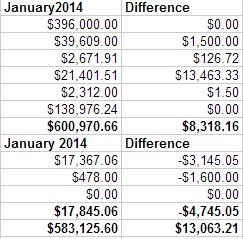- @Elle_CM Natalie's raid looked like it was filmed with a strobe light. Lame CGI in reply to Elle_CM #
- I want to get a toto portable bidet and a roomba. Combine them and I'll have outsourced some of the least tasteful parts of my day. #
- RT @freefrombroke: RT @moneybeagle: New Blog Post: Money Hacks Carnival #115 http://goo.gl/fb/AqhWf #
- TED.com: The neurons that shaped civilization. http://su.pr/2Qv4Ay #
- Last night, fell in the driveway: twisted ankle and skinned knee. Today, fell down the stairs: bruise makes sitting hurt. Bad morning. #
- RT @FrugalDad: And to moms, please be more selective about the creeps you let around your child. Takes a special guy to be a dad to another' #
- First Rule of Blogging: Don't let real life get in the way. Epic fail 2 Fridays in a row. But the garage sale is going well. #
What’s in it for me?
Lately my son has been in full-on greed mode. It seems like every time I talk to him he asks me to give him something buy him something, do something.
“Dad, can you buy me a Yu-Gi-Oh card?”
“Dad, can you buy me a videogame?”
“Dad, can I get this?”
“Dad, can I get that?”
That is really kind of obnoxious. My response has turned into “What’s in it for me?”
Really, he’s constantly asking for stuff and he’s trying to provide no value back. What kind of lesson would I be teaching him by handing him everything he’s asking for? So, I’ve decided to make him come up with a value proposition: “What’s in it for me?”
Now, when he asks me to buy him a video game, I ask what’s in it for me.
Sometimes, he comes back with “Well nothing, you just love me.” That is garbage. I’m not going to buy him stuff just as because I love him and teach them that you can buy someone’s affection or that you should be paying for someone’s affection.
Other times he comes back with “If you buy me video game, I will clean all of the poop out of the backyard.” (We have a dog. I’m not messy.) That seems like a much better deal.
Other times, he reminds me that I owe him back-allowance. That one’s a given. If I owe him more than whatever he is asking for, he’s going to get it.
Sometimes, he’ll say that he willing to do a bunch of extra chores or something, but he is learning that he needs to trade value for value instead of assuming that every whim he’s got is going to be indulged by me just because I’m his parent and I’ve been generous in the past.
Changing Our Situation
In September 2005, I bought my car, a Chrysler Pacifica. I got it on a loan. Two months later–seven years ago this month–I was told I’d be laid off at the end of the year.
Two weeks ago, we bought a Chevy Tahoe with a loan. Last Monday, my wife was permanently laid off after 12 years with her company. She was told that, if her department opened back up, she’d be welcome to reapply for her job and start as a new employee.
Car loans mean layoffs at my house.
Last Tuesday, I got a formal offer for a new job. I accepted.
I am now a full month away from knowing exactly what my semi-monthly paychecks will be. My wife is getting her final paycheck later this week, which will include a week of severance pay.
For the first time in a number of years, I don’t know what my income looks like. I don’t have a clear long-term picture or a good short-term picture.
I’m not worried.
For the first time in my life, I’m not living paycheck-to-paycheck. Having a couple of pay periods act wonky isn’t going to hurt. Yes, we are going to cut back, but we can manage for a few months without worry. We aren’t going to sweat over putting food on the table.
That is an incredible feeling.
George Zimmerman: The High Cost of a Legal Defense

Most people have heard of the controversial nature of the George Zimmerman murder trial. Zimmerman, who defends his actions and is claiming self-defense, is on trial for murdering Trayvon Martin, a 17-year old with a social media profile that projects anything but innocence. While his defense attorneys claim that race had nothing to do with the murder, the prosecution thinks differently. In fact, a majority believe that Trayvon Martin would still be alive today if he hadn’t attacked Zimmerman. Regardless of your stance on the case, there is no denying the fact that Zimmerman’s trial is building strong emotions from both sides.
Fixed Prices Versus Variable Prices
Not everyone has a group of supporters raising money to pay for their legal defense. Just because Zimmerman has bad credit does not mean that he had to leave his legal defense up to a public defender in Sanford. If you do not have a Legal Defense Fund where people can donate money to your defense costs online, you will need to distinguish between fixed prices and variable prices for legal defense. During your consultation, the defense attorney should be able to quote you a fixed price based on the case details. Experienced attorneys do not charge on a pay as you go basis because they are confident their abilities. The actual fixed price of the attorney depends on the case, and can range anywhere between a $1000 and hundreds of thousands of dollars. O’Mara and West, who are defending Zimmerman, have quoted $1 million for their services in total. While they have not be paid completely by the Zimmerman Defense Fund, this is money that is due to them.
The Cost For Expert Witnesses
Zimmerman’s team introduced several expert witnesses including an animator, a medical examiner, and a self defense expert. All of these witnesses are paid to testify, and the cost is not always included in the initial quote. If your case is complex, there may be a need for an expert witness. When you are pricing the cost of defense, see if this is included. Assume that you will spend about 10% more than quoted so that you can cover all of the outside costs.
Zimmerman may have been unemployed and working as a volunteer neighborhood watch member, but he does have one of the most experienced legal defense teams working for him to get a not guilty verdict. You may not need a million dollars, but legal defense is not cheap. Keep in mind that you get what you pay for when legal defense is concerned.
Insurance
Related articles
Net Worth Update – January 2014
This may be the most boring type of post I write, but it’s important to me to track my net worth so I can see my progress. We are sliding smoothly from debt payoff mode to wealth building mode.
Our highlights right now are nothing to speak of. We did let our credit card grow a little bit over the last couple of months, but paid it off completely at the end of December. It grew mostly as a matter of not paying attention while we were doing our holiday shopping and dealing with some car repairs.
That’s it. We haven’t remodeled our bathrooms yet, but we have the money sitting in a savings account, waiting for the contractor. We haven’t bought a pony yet, but we did decide that a hobby farm wouldn’t be the right move for us. We’ll be boarding the pony instead of moving, at least for the foreseeable future.
Our net worth is up $13,000 since September. Our savings are up and our retirement accounts are down because there are two inherited IRAs that we need to slowly cash out and convert to regular IRAs.

Twinkies: A Failure of Unionization

Twinkies may survive nuclear warfare, but the iconic sweet treat ultimately couldn’t withstand the might of the unionized workforce. Faced with mounting losses and overwhelming debt, due in no small part to the relentless demands of the various unions representing the nearly 19,000 employees, Hostess Brands filed bankruptcy for the second time in January 2012 and ultimately requested permission to liquidate it’s assets in November of last year when a buyer failed to materialize. While many factors played a part in the demise of the maker of such all-American snacks as Ding Dongs and Ring Dings, as well as childhood favorite Wonderbread, there is no denying the fact that costs imposed by union contracts were a major factor in the shuttering of this once-beloved company.
Certainly America’s changing eating habits, increased competition from such companies as McKee Foods, makers of Little Debbie snack cakes, and rising commodity costs all contributed to the ultimate demise of Twinkies. There is no doubt, though, that union contracts inhibited the company’s ability to adapt and make the necessary changes to remain profitable. Not only were employee costs out of control, ridiculous union rules made it nearly impossible for the company to make money. These are just a few of the rules that hampered Hostess’ management:
- Twinkies and Wonder Bread could not be delivered on the same truck.
- Drivers could only deliver one product, even if they did not have a load and a load of another product was waiting to go out.
- Drivers could only drive. They had to wait for loaders to fill their trucks.
- Likewise, loaders could only handle one product. Their contract prohibited a Twinkie loader from helping out if the Wonder Bread loaders were shorthanded.
Yes, management agreed to these terms, but often they were forced to do so in order to prevent a costly strike. In fact, it was a labor strike that lead to the decision to liquidate.
Unions are meant to protect workers from dangerous working conditions, overbearing management and unfair labor practices. Ensuring a living wage and decent benefits is another of their responsibilities. However, it is evident that in this case, the unions became as much an enemy of the Hostess employees as of the company’s management. As a result of their unwillingness to compromise and make wage and benefit concessions, almost 20,000 people no longer have a job that needs to be protected. In the end, the unions drove not only the company but themselves out of business.
Not to fear, however. Two private equity firms acquired Hostess’ assets last fall and are beginning to turn the company around. Production of Twinkies began again in June, and the gooey sponge cakes returned to store shelves on July 15. The workforce has been dramatically reduced and will not be unionized. In the end, probably the only winner in this battle is America’s sweet tooth.












